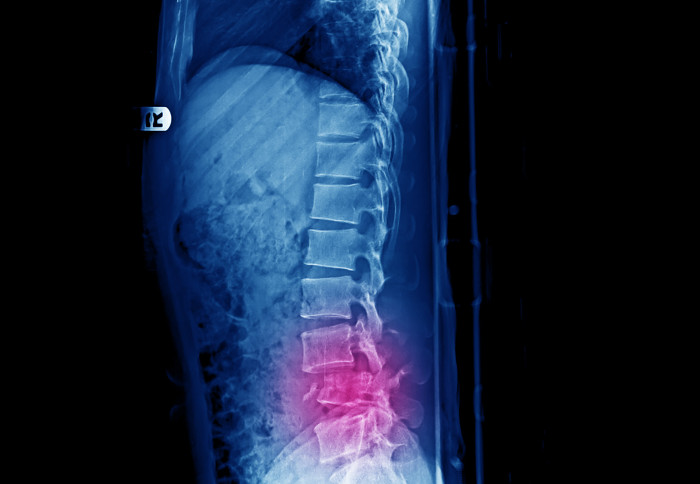Researchers aim to identify patients at high risk of bone tumour fractures

Credit: Shutterstock
A new £7 million research project could help clinicians identify and assist patients at high risk of vertebrae fractures caused by bone tumours.
Researchers from Imperial College London, the University of Leeds and UCL have received funding to develop new imaging and modelling techniques which could be used to prevent fractures by identifying at-risk patients early.
Identifying these patients could allow them to receive implants made from metamaterials normally used in the aerospace industry which Imperial engineers are repurposing for clinical use.
Bone tumours, known as metastatic bone disease, can spread from a primary cancer elsewhere in the body, such as breast cancer.
These tumours can cause vertebrae – the bones that make up the spine - to weaken and eventually fracture, leaving patients with severe pain and immobility. In some cases, the fracture can also damage the spinal cord and cause paralysis.
"By working as part of the multidisciplinary team we aim to apply the new approaches and knowledge to improve the quality of life of late-stage cancer patients." Dr Rob Hewson Department of Aeronautics at Imperial College London
The researchers on the project hope that by identifying patients who are at a high risk of vertebra fracture, clinicians will be able to fit tailor-made implants to strengthen the spine and prevent the fracture.
Professor Richard Hall, from the University of Leeds’ School of Mechanical Engineering, who is leading the research collaboration, said: “The problem facing doctors is they have no way of knowing which of the spinal vertebrae is going to collapse. When that happens, patients often require major surgery which involves a lengthy period of rehabilitation.
“Our approach is to intervene by developing new techniques and equipment that will prevent spinal fractures, crucially helping to maintain a patient’s quality of life at a time when they may be terminally ill.”
Researchers are working to develop new techniques and materials based on personalised medicine to assess an individual’s risk of the spine becoming so weak that a vertebra could fracture.
Through developing new approaches to patient imaging and computer modelling, the researchers hope that clinicians will be able to track tumour development in the spine over time and how it may be weakening individual vertebrae.
Metamaterial implants
The implants will be made using a metamaterial, a material that has uncommon properties that can be fine-tuned to the needs of the patient – for example, the material could harden when under stress and after implant deployment.
Structural metamaterials are currently being developed for use in the aerospace industry, but researchers will apply some of the design optimisation approaches for use in protecting vertebrae from fractures.
Dr Rob Hewson, a co-investigator for the project, from Imperial’s Department of Aeronautics, said: “This project allows us to expand our expertise in analysing, optimising and 3D printing structural metamaterials.
“By working as part of the multidisciplinary team we aim to apply the new approaches and knowledge to improve the quality of life of late-stage cancer patients.
“We will also be able to apply some of these new approaches back into the aerospace and mechanical engineering sectors where advanced metamaterials have a wide range of potential applications.”
The advanced manufacturing group led by Dr Connor Myant from Imperial’s Dyson School of Design Engineering will work to develop a novel 3D printer capable of constructing the intricate implant designs.
Faster recovery time
Researchers hope that using minimally invasive techniques for the implants will help patients recover from surgery within days rather than weeks or months for more invasive surgery after spinal fracture.
This work aims to assist the NHS long-term plan for cancer treatment, which calls on researchers to develop new interventions that would improve the quality of life for patients living with advanced cancers.
The project, ‘Oncological Engineering: A new concept in the treatment of bone metastases’, has received £7 million in research funding, including a £5.6 million grant from the Engineering and Physical Sciences Research Council (EPSRC), part of the Government’s UK Research and Innovation body.
Professor Rebecca Shipley, from the Department of Mechanical Engineering at UCL, who is one of the co-investigators, said: “This funding will enable us to significantly expand our work combining computational modelling with cutting-edge imaging to better understand how cancers grow and interact with surrounding tissues.
“We are excited to use these multidisciplinary frameworks to understand vertebra fracture risk and ultimately help to improve quality of life for cancer patients.”
Article supporters
Article text (excluding photos or graphics) © Imperial College London.
Photos and graphics subject to third party copyright used with permission or © Imperial College London.
Reporter
Conrad Duncan
Communications Division